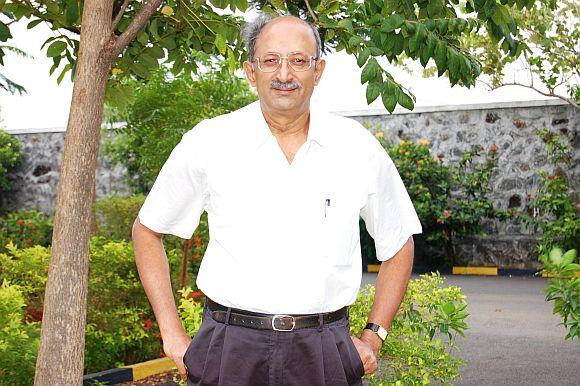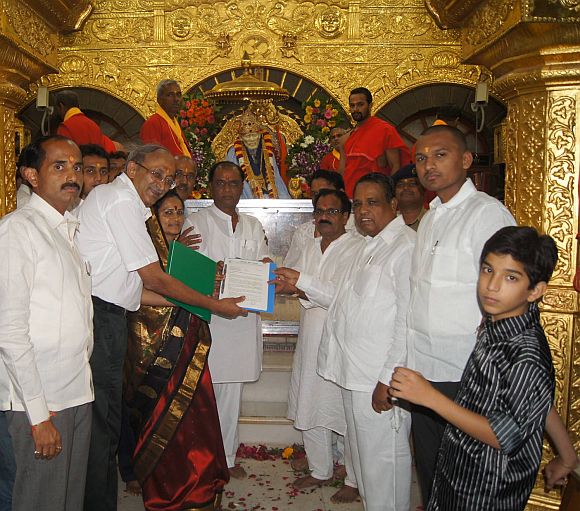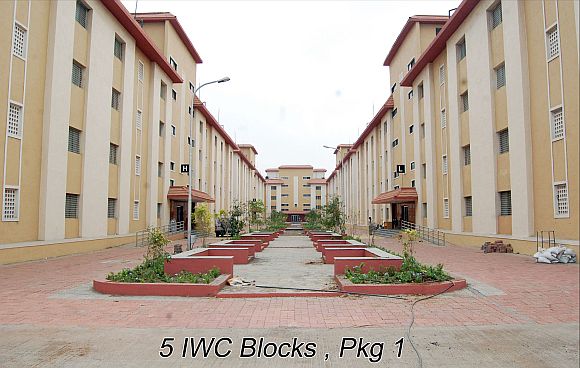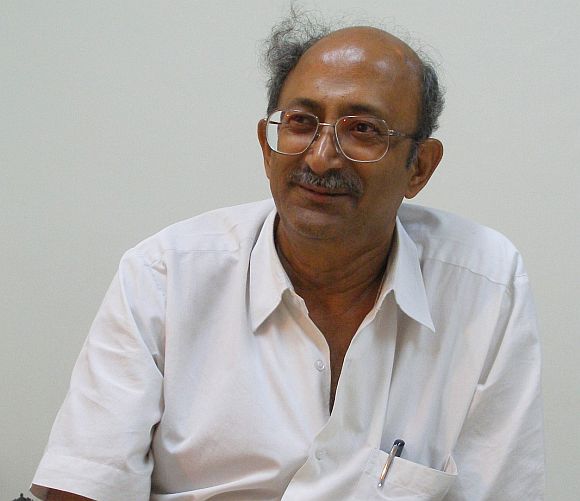
K V Ramani is the co-founder of Nasscom, the organisation that represents and sets the tone for public policy for the Indian software industry.
A successful entrepreneur, Ramani founded Chennai-based Future Software and also co-founded Hughes Software in Delhi. But there's another side to him; of a well-known philanthropist.
Ramani, who has been donating 80 per cent of his earnings to the Shirdi Sai Trust, was recently in the news for having built a Sai Ashram for Rs 110 crore and handed it over to Sri Saibaba Sansthan. Sai Ashram I and II together form a complex, which can accommodate 14,000 devotees. The Ashram will formally be inaugurated by President Pranab Mukherjee on November 16.
In an interview with rediff.com's Shobha Warrier, he talks about how he lived the life of an entrepreneur and a philanthropist at the same time.
When did you become a devotee of Shirdi Sai Baba?
It happened around 35 years ago. I was a young man of 27, not very religious or spiritual or a devotee of Shridi Baba. A family member fell very ill and the doctors could not diagnose the problem. All in the family were very worried.
Then someone asked me to pray at the Shirdi temple in Mylapore. I did so and promised to visit the temple every Thursday. And then the miracle happened. That night itself, he became completely all right. Next day, when the doctors came, to their surprise, they found him completely cured.
It was like a chamatkar (miracle) that happened in front of my eyes.
...

You said you were not a believer then. Did the rationale in you fight with the spiritual in you?
I was not spiritual then; a young unmarried man of 27. Now, I am 62. There was no rationale working then. When my prayers were answered, I decided to fulfil the promise. For me, it was like visiting a temple after writing an exam well.
But the thought that somebody pulled me to visit the temple every Thursday was sowed in my mind on that day. It was like Baba pulled me there not to return.
Slowly, did you become spiritual?
Yes, I did. Sai being a satguru, he guides you step by step. He prepares you for the next level, elevates you and lets you move. It was like helping a child walk. It took me several steps to reach where I am today.
Initially I didn't know the difference between religion and spirituality. Now, it has gone beyond both religion and spirituality and reached the stage of devotion. Whatever I am today, it is Baba's creation.
What was your experience of going to Shirdi?
After I started going to the Shridi Sai Temple at Mylapore, I had planned many times to go to Shirdi but somehow, it always got postponed.
I used to spend 15 days in Delhi in those days, as I had co-founded Hughes Software in Delhi. Once myself and the late Dewang Mehta (of Nasscom) who was like a younger brother to me, were planning a weekend trip to Shirdi from Delhi. Both of us got into a cab and went to the airport. But somehow, that day also, the trip got cancelled. Finally, I went only after 10 years or so. I want to say, it happened not when I planned but when Baba wanted.
When I went there finally, it was a mind-boggling experience. It was such a spiritual experience that you can't explain it in words. After that, I have been going there at least once a year but in the last few years, especially after taking up the Sai Ashram project, I have been going there more frequently.
...

When did you start your philanthropic activities there?
Initially, I was going there as an ordinary devotee, standing in the queue and getting a darshan.
I started the Shirdi Sai Trust in my house in Chennai in 1996 with an amount which I set aside every month for the people to build Sai temples, do Sai Prachar and also to help poor people in education, food and healthcare. I did this on a very small scale in my personal capacity. I still don't take any donations for the Trust; it's only my own money.
Somehow, the Trust grew bigger and bigger when my income increased and thus my contribution. It is a private trust run by me from my home on Saturdays and Sundays.
You said you kept a part of your income for the Trust. What do you call it, offering to God, charity or philanthropy?
I would say it is a combination of all the three that you have mentioned. When I help build Sai temples and do Sai Prachar, it is my offering to the God. I want more people to gain something from Sai Baba like I did. I want others also to experience the joy and spirituality that I experience.
Then, helping the poor! Baba has said, the money that I give you is not for your enjoyment alone. He says, you enjoy what you need and the rest, you use for your karma and dharma. It meant, we should use the money for the benefit of others who need help.
What you have given now at Shirdi is not a small amount; it is Rs 110 crore. You used the money you got from selling Future Software, which you founded in Chennai, and Hughes Software, which you co-founded in Delhi. Why did you decide to sell the companies you had started?
I felt I have worked long enough: I had worked for more than 35 years. And I was getting an opportunity to sell them, which was good for the company, employees and myself. The offer benefited all of us.
So, I sold both the companies in 2004 and retired from work. I felt we had too much money and I didn't want that much money. Like someone wrote, I did not put the money in stock market.
I kept 20 per cent of what I got for the family and put 80 per cent in the Trust saying, 'Baba, you gave me too much money, I don't need this much'.
...

How much did you have to think to donate Rs 110 crore to Shirdi?
I gave Rs 110 crore now. If you add what I have given all these years, it is much more than that. What we are spending every year is from the interest I get from the corpus I have invested. This Rs 110 crore comes from the interest of the corpus of the last 5-6 years.
Was it because you saw devotees coming to Shirdi suffering for lack of accommodation that you decided to build a complex for them?
In fact, I was not thinking of building anything at all. We had some money in the Trust which I wanted to use for some good cause. When I told the Shirdi Sansthan PRO that we have some fund to support a good project, he said the biggest problem there was accommodation.
Then I saw elderly people sitting on the roads and women feeding their babies in the open as they could not get any accommodation. When I visited the places, I found people waiting for hours to get a room.
When I looked at the statistics, I found that 30-40,000 devotees come to Shirdi every day. During weekends, it is 1 lakh and during festival times, it is 3-4 lakh.
And the accommodation available with the Sansthan was less than 10,000. So, there was a short supply of at least 20-25,000 rooms.
That is when we decided to take up the project. That was six years ago.
It took a year and a half to get the l#8743 the land of about 20 acres was given by the Sansthan. It took us about four-and-a-half years to complete the construction of Sai Ashrams. Now it is ready and on Baba's maha samadhi day, it was handed over to the Sansthan. It will be completely owned, maintained and managed by the Sansthan, and we have no rights over it after we handed it over.
When I go there also, it is not necessary that I will get a room there.
...

There was a report that you wanted some rooms for yourself.
It was a distorted report. It was planted by hotels affected by us building such a huge complex. Our Sai Ashram 1 has 1,536 rooms and Sai Ashram 2 has 192 dormitories. Both together can accommodate 14,000 people.
What the Sansthan will now provide is good accommodation at a lower price. So, who is affected? The hotels!
In India, if you do good things, you are criticised. It seems it is very easy to do bad things and very difficult to do good things. The Aurangabad bench of the Mumbai high court dismissed a PIL filed on this matter.
So, what you have constructed there is from your personal money?
No, I would say, it is done by the Shirdi Sai Trust, Chennai, which was started by me and the corpus was made with my family money. That is all I want to say.
Is it true that you plan to construct an orphanage and an old age home at Shirdi?
I am waiting for the Sansthan to find the land. Once they do so, I will do that.
Is what you do, giving back something to society?
Yes, it is. Many people do that and many people give more money than me in charity; like my dear friend Narayana Murthy, Nilekani, Premji, etc. Tatas have been doing it for many generations. The only difference is, I give 80 per cent of what I make and keep only 20 per cent for myself and my family.
How do you differentiate the entrepreneur in you and the spiritual and philanthropist in you? Where do they merge?
The entrepreneur in me creates institutions which can provide employment, which can create and showcase technological products to the world. We didn't build a services company; we built a technology product company. We focused primarily on the telecom sector and had branches in the UK, Germany, in the US, Japan, Korea and China.
Building something globally gave me the satisfaction as a businessman and an entrepreneur. The satisfaction I derived was materialistic.
What I do for the Shirdi Sai Trust is not materialistic; it is spiritual.
Entrepreneurship gives you the joy of building an organisation and creating wealth. Philanthropy gives you the joy of sharing and distributing the wealth to the needy.